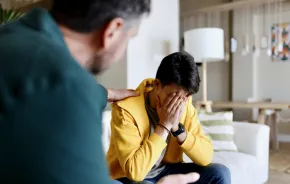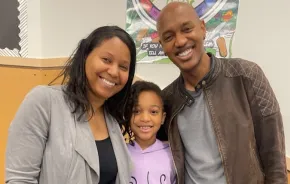
Nadine Burke Harris, M.D., didn’t intend to dedicate her medical career to researching the lifelong impacts of childhood adversity. But that changed when she met a little boy she refers to as Diego.
Dr. Burke Harris met Diego when his mother brought him to her clinic for a screening for Attention Deficit Disorder (ADD) at the suggestion of his teachers. But as Dr. Burke Harris conducted her examination, she was puzzled by his symptoms: Diego hovered around the 50th percentile for height and his weight was that of a 4 year old. While his behavior had led his teachers to suspect he had ADD, Dr. Burke Harris suspected this wasn’t the case; she sent Diego out of the room and spoke to his mother about what else could be causing these symptoms. His mother revealed that Diego had been sexually assaulted three years earlier. It was this trauma, Dr. Burke Harris posited, that was affecting Diego’s health, behavior and even his growth.
It might sound unlikely, but Dr. Burke Harris’ suspicions aren’t without scientific merit. In the mid-1990s, Center for Disease Control and Prevention (CDC) and Kaiser Permanente teamed up to conduct the Adverse Childhood Experiences (ACE) study to research the connections between childhood abuse and neglect and later-life health and well-being. The ACE study resulted in a specific list of ACEs that have direct links to a wide array of poor health outcomes, including impaired academic achievement, a risk of intimate partner violence, heart disease, alcoholism, financial stress and many other life-threatening behaviors and illnesses.
As Dr. Burke Harris studied the statistics of her own patients’ neighborhood, San Francisco’s less-affluent Bayview Hunters Point, she saw young patients dealing with incredible levels of trauma and stress: The number one cause of death in that ZIP code was violence. Children who grew up there were six times as likely to develop asthma and 12 times as likely to develop uncontrolled diabetes. She recognized that these children needed medical care that incorporated mental health treatment too.
She recognized that these children needed medical care that incorporated mental health treatment too.
Dr. Burke Harris began to implement the ACEs into her patient care, utilizing the survey to learn more about her patients and any traumatic experiences that could impact their health. But while this helped, Dr. Burke Harris knew there was more she could do.
Although Dr. Burke Harris is a pediatrician, she realized she needed to treat the parents of her patients too. She began to work with Dr. Alicia Lieberman, who specializes in child-parent psychotherapy (CPP). Dr. Lieberman’s research led to the development of the CPP protocol, which Dr. Burke Harris implemented in her practice along with her colleagues. Through joint therapy sessions, Dr. Burke Harris and her team were able to work with their patients and their parents together, using psychotherapy to talk through both past traumas experienced by the parents as well as current issues affecting the parent/child attachment.
Dr. Burke Harris presented her findings at a wildly successful TED talk in September 2014: “How childhood trauma affects health across a lifetime.” (To date, the TED talk has more than 3.5 million views.) She wasn’t prepared for the response. “I ended up getting a ton of emails and Facebook messages and even LinkedIn messages,” she says. “All of these notes from around the world saying, ‘Oh my goodness, I’ve experienced a lot of adversity! I’m adopted, my husband had this trauma, what can I do? What can we do for my child?’”
“That’s why I wrote a book,” Dr. Burke Harris says. “I took all the science, the research, the promising work that I understood and made it available to the public in a way they could understand.” Her book, “The Deepest Well: Healing the Longterm Effects of Childhood Adversity,” uses stories from her research to help parents and caregivers understand the connections between trauma and health. By learning about the connections Dr. Burke Harris made in her professional and personal life, the reader is able to reflect on their own experiences and how trauma has affected them and the ones they love. With this knowledge, parents and caregivers can find resources such as doctors and therapists who utilize ACEs in their work and will help heal the entire family rather than focus only on one symptom at a time.
In Seattle, nearly one-fifth of children have two or more ACEs, according to The Data Resource Center for Child & Adolescent Health. These students suffer from poverty, family problems, even violence, and the results include poor academic performance, mental health issues and physical health problems. “Toxic stress puts our bodies and brains at risk,” Dr. Burke Harris says. “It affects how we learn, how we parent, and how we react at home and at work.”
In Seattle, nearly one-fifth of children have two or more ACEs.
Dr. Burke Harris continues to see patients once a week at her clinic. Her clinic is a model for other pediatric practices across the country, and directors now visit her practice in order to learn from their model. Recently, Seattle Children’s Hospital visited Bayview Child Health Center and has begun implementing ACE screening.
In spite of all of the trauma and toxicity that Dr. Burke Harris has seen throughout her research and work, she is confident that this cycle can end. “I don’t think people who grew up with ACEs have to ‘overcome’ their childhoods. I don’t think forgetting about adversity or blaming it is useful,” she says. “Once you understand how your body and brain are primed to react in certain situations, you can start to be proactive about how you approach things.”











